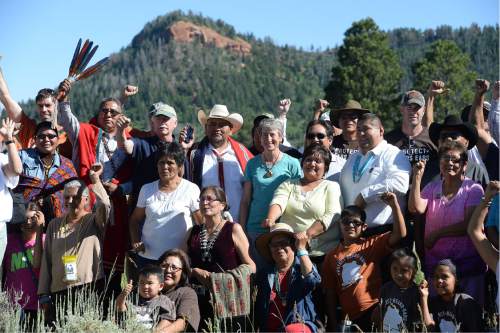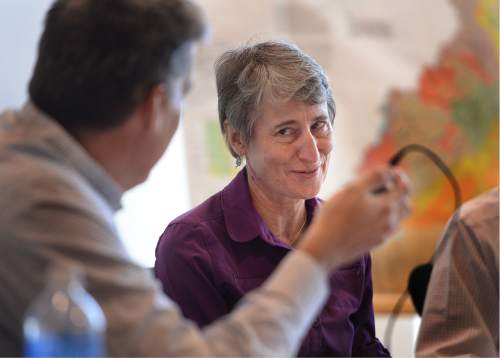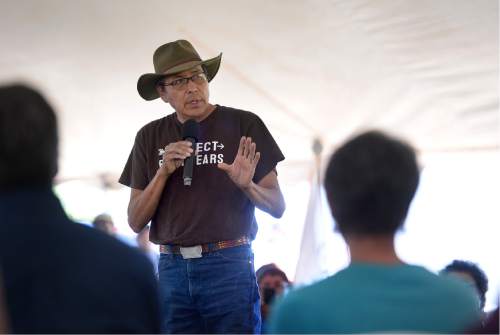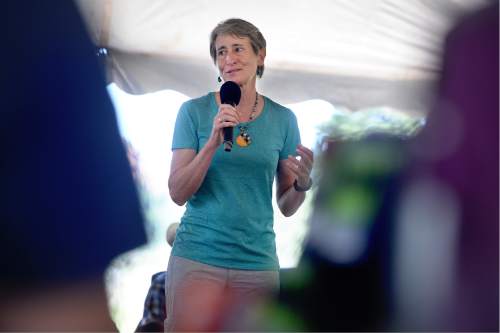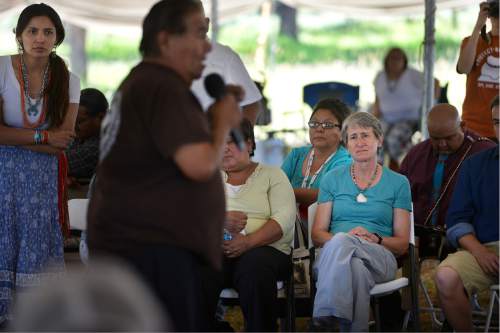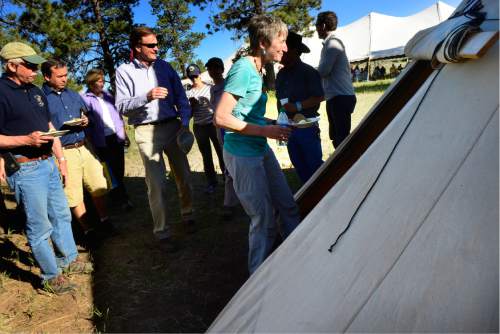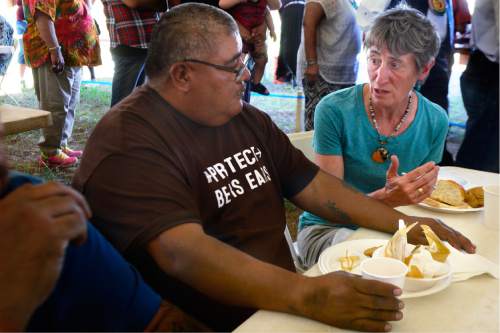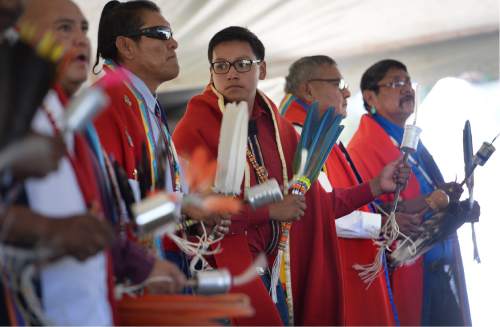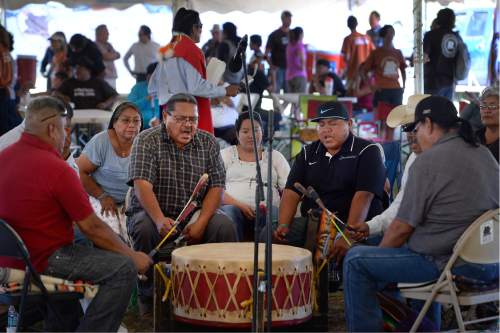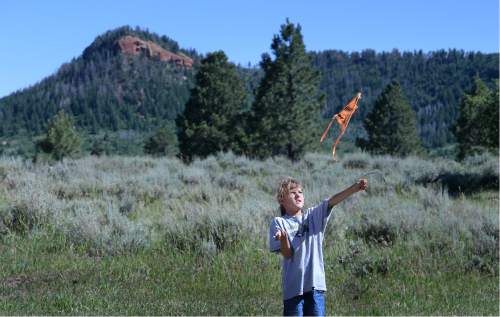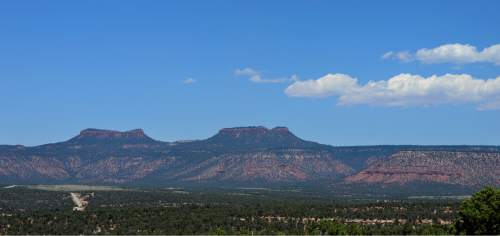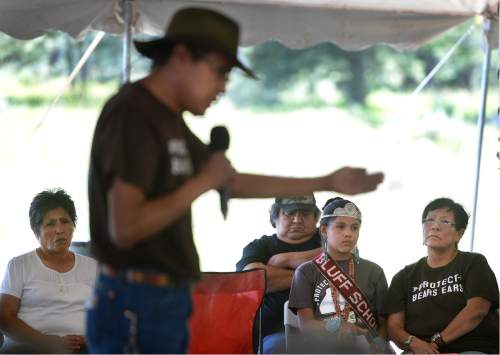This is an archived article that was published on sltrib.com in 2016, and information in the article may be outdated. It is provided only for personal research purposes and may not be reprinted.
Bears Ears Meadows • Interior Secretary Sally Jewell said Friday that the administration wants to protect a culturally significant area of southeastern Utah before President Barack Obama leaves office — whether that's accomplished through legislation brought by Utah's delegation or through the use of the Antiquities Act.
"We are running out of time," Jewell said on Day Three of a four-day tour of southeastern Utah that culminates Saturday in a public meeting in Bluff.
On Thursday, after three years and untold meetings with various interest groups, Reps. Rob Bishop and Jason Chaffetz unveiled a lands proposal they say marks a compromise among business, recreation and cultural stakes on Utah's public lands.
Jewell — speaking from the shadows of the Moon House Ruin, a centuries-old Puebloan dwelling that is one of the Cedar Mesa's most well-preserved archaeological sites — said it was "disappointing" that the bill took so long to be introduced, even if it appears to have addressed some concerns raised by draft forms.
Later Friday, Jewell and other Interior Department executives attended a Bears Ears Inter-Tribal summer gathering, at which they met with leaders of the coalition that has called for Obama to designate a 1.9 million acre monument that would protect the Cedar Mesa and the area surrounding the iconic twin buttes for which Bears Ears is named.
Coalition leader Regina Lopez-Whiteskunk told the Interior group that land managers have touted American Indians' "advisory" roles and "meaningful consultation," but "there's never been teeth behind it."
The Bears Ears proposal would ensure that American Indians retain a say in stewardship of lands that are central to their heritage, she said.
The prevailing attitude was in stark contrast to a meeting held Thursday at Monticello's Hideout Community Center.
There, about two dozen members of the Blue Mountain Dine and other tribes said the pro-monument Dine Bikeyah nonprofit had been influenced by outside groups and endangered access to cherished lands with shortsighted calls for a monument.
On Friday evening, about 200 people gathered at Bears Ears Meadows under a large white tent while coalition leaders spoke in support of a monument.
Navajo Council Delegate Davis Filfred said the opponents who spoke Thursday in Monticello said they want to protect their access to hunting rights, herbs and wood.
"We're both saying that," he said. "… We want no more ATVs to tear up this ground. We don't want [any] more roads. That's all we're saying."
Navajo Council Delegate and former San Juan County Commissioner Kenneth Maryboy said everything around him holds significance. From shrubs to echoes in the canyons, "these are the holy people," he said.
After stopping Jewell for an interview that he would add to his documentary, New York University doctoral anthropology student Angelo Baca — a Navajo and Hopi — marveled that so many had congregated in the hard-to-access region that is the root of stories from his grandparents.
"We all stopped fighting and have come together," he said.
Jewell carried sage that was sent to her by Utah author and conservationist Terry Tempest Williams, and she echoed Filfred's sentiment that a consensus is hidden amid the debate. Jewell drew applause when she bent down to palm the earth as she spoke at the center of a circle to coalition supporters.
Jewell said she's been surprised by "the scope and the scale of the archaeological treasures that are in this region," in which dramatic canyons and gulches often are obscured by the unique geological nature of the expanse. "I had no idea."
Earlier, after traversing the slick rock ascent to Moon House in remote McLoyd Canyon, Conservation Lands Foundation Executive Director Brian O'Donnell said he viewed the latest Public Lands Initiative iteration as "Strike Four" and expressed concern that the delegation is running out the clock on Obama's administration.
Jewell said she's shared that concern with Utah's delegates, but that the staffers for Bishop and Chaffetz, at least, have appeared to be sincere about their desire to run a successful bill.
The Public Lands Initiative is a "very big, complex bill," Jewell said. "They're going to have to come up with something that is passable."
Her office wants to be assured of three things about the legislation: 1. That it protect places in southeastern Utah that currently have no protection and are at risk, 2. That American Indians from the region or who have a history in the region can continue to use the land in the way their ancestors did, and 3. That the executive branch and the Interior Department retain "the tools to do their jobs."
That means, for instance, no limit on future use of the Antiquities Act in seven Utah counties that have worked with Utah's delegation, which Bishop and Chaffetz have called for in a companion bill.
"We are against anything that limits the president's authority," Jewell said.
Should Obama choose instead to designate a monument in the region, "What I'm learning on this trip will help shape that," Jewell said.
Her 3-mile roundtrip hike to the Moon House Ruin — inhabited as long ago as 200 B.C. by Basketmakers and as recently as 1270 by Puebloan tribes that were eventually likely driven from the cliff dwelling by drought — presented Kane Gulch ranger Scott Edwards with the opportunity to explain the hardships of managing 2 million acres from a station with two full-time staffers.
The internet has brought more inexperienced hikers who sometimes lack reverence for what was once a pristine landscape, Edwards said. He charges them with "subconscious looting" — picking up pottery shards that were once ankle-deep in places and are now scarce.
"They've robbed this place blind," he said. "... If you'd seen all I've seen here, you'd be depressed."
Friends of Cedar Mesa Executive Director Josh Ewing — wearing flip-flops, he said, to honor the people who traversed this slickrock in sandals made from yucca cordage — said there have been 30 incidents of vandalism in the past five years. The best approach to protection used to be secrecy, he said, but "you just can't keep a secret in this modern day and age."
Were Obama to confer monument status on the area, Ewing acknowledged that might bring still more traffic, but he believes added resources would allow rangers to funnel tourist traffic and control their impact.
Coalition leaders urged members to attend Saturday's meeting in Bluff, at which Jewell said she anticipates a large turnout; she also repeated a plea for respectful conduct between participants.
Twitter: @matthew_piper


